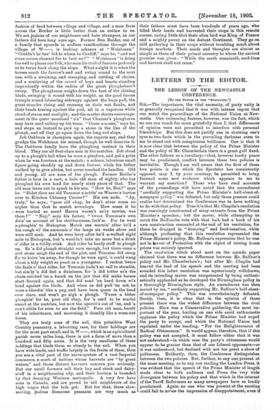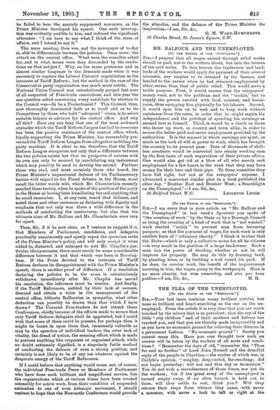THE LESSON OF THE NEWCASTLE ' CONFERENCE.
LETTERS TO THE EDITOR.
[TO THE EDITOR 07 THE "SPECTATOR."]
SIK,—The importance, the vital necessity, of party unity is so generally recognised that it was with intense regret that one noted the proceedings of the National Union at New- castle. One redeeming feature, however, was the fact, which no one can vouch for more gratefully than I, that differences of opinion were not permitted to interfere with personal friendships. But this does not justify one in shutting one's eyes to two facts which in the prevailing darkness seem to me to stand out with conspicuous brilliance. One is that it is now clear that between the policy of the Prime Minister and the policy of Mr. Chamberlain there is a great gulf fixed. The other follows as a corollary,—that, however loudly peace may be proclaimed, conflict between these two policies is inevitable. Though I am well aware that the first of these two points is one which the Spectator has consistently opposed, may I, by your courtesy, be permitted to bring forward some new evidence which appears to me to warrant my assertion ? Those who have read accounts of the proceedings will have noted that the amendment "cordially supporting the Prime Minister's half-sheet-of- notepaper policy" was defeated, but only those present could realise how determined the Conference was to have nothing to do with that policy. Trim it is that Mr. Chaplin's resolution was cunningly constructed of stray extracts from the Prime Minister's speeches ; but the mover, while attempting to catch the Balfourite vote with that bait, had a hook of his own construction concealed at the end of his resolution, for there he dragged in "dumping" and food-taxation, while although professing that this resolution represented the Prime Minister's policy, Mr. Balfour's expression that he was not in favour of Protection with the object of raising home prices was entirely ignored.
The resolution which stood next on the agenda paper claimed that there was no difference between Mr. Balfour's policy and Mr. Chamberlain's ; but after Mr. Chaplin had heaved the lead of his speech and the meeting had been sounded this latter resolution was mysteriously withdrawn, and its intending mover was compensated by being enthusi- astically applauded as he developed the Birmingham policy in a thoroughly Birmingham style. An amendment was then moved by me, "cordially supporting Mr. Balfour's half-sheet- of-notepaper policy." This was overwhelmingly defeated. Surely, then, it is clear that in the opinion of those present there was the widest difference between the rival policies. Here was a Conservative gathering, the most im- portant of the year, hurling on one side amid enthusiastic applause the policy which the Prime Minister had urged the party to accept, and which the National Union had reprinted under the heading, "For the Enlightenment of Radical Obtuseness." It would appear, therefore, that if this policy was not accepted, it must follow either that it was not understood—in which case the party's obtuseness would appear to be greater than that of our Liberal opponents—or it was understood, but declined with not too great a show of politeness. Evidently, then, the Conference distinguishes between the two policies. But, further, to any one present at the mass meeting, as to any one reading the London Press, it was evident that the speech of the Prime Minister at length Made clear to both audience and Press the very wide divergence between his policy and that which in the interest of the Tariff Reformers so many newspapers have so loudly proclaimed. Again, no one who was present at the meeting could fail to noqce the impression of disappointment, even if
be failed to hear the scarcely suppressed murmurs, as the Prime Minister developed his speech. One such interrup- tion was evidently audible to him, and induced the significant utterance : "I am here to say what I think of the state of affairs, and I intend to say it."
The mass meeting then was, and the newspaper of to-day is, able to differentiate between the policies. Once more : the attack on the central office. What were the remedies asked for, and in what terms were they demanded by the resolu- tions on that subject ? Why, on the same pretences and in almost similar language to the demands made when it was necessary to capture the Liberal Unionist organisation in the interests of Tariff Reform ; but the method in the case of the Conservative party organisation was much more subtle. The National Union Council was ostentatiously purged last year of all suspected of Free-trade convictions, and this year the one question asked concerning every candidate for election to the Council was—Is be a Protectionist ? This Council, then, now thoroughly dominated both as to itself and as to its Committees by those who hold " advanced " views, is to select suitable helpers or advisers for the central office. And why all this ? Dare any one deny that one of the most awkward obstacles which the Tariff Reform League has had to overcome has been the passive resistance of the central office, which, loyally supporting the Prime Minister, has successfully pre- vented the Tariff Reform League from altogether nobbling the party machine. It is clear to me, therefore, that the Tariff Reform League recognises not only that a difference between the two policies exists, but that its prospects of success with its own can only be secured by annihilating any instrument which may possibly be used to develop the second. Further, those who read, and most certainly those who heard, the Prime Minister's impassioned defence of his Parliamentary- tactics with regard to the Fiscal debates in the House, must recall the bitter words with which Mr. Chamberlain recently assailed these tactics, when he spoke of the position of the party in the House as having been humiliating beyond anything that he could remember. I, at any rate, heard that defence, and noted those and other sentences as declaring with dignity and emphasis that not only was there a wide difference in the methods of conducting the controversy, but also that the ultimate aims of Mr. Balfour and Mr. Chamberlain were very far apart.
• Then, Sir, if it be now clear, as I venture to suggest it is, that Members of Parliament, candidates, and delegates practically unanimously and openly reject the ipsissima verba of the Prime Minister's policy, and will only accept it when added to, distorted, and enlarged to suit Mr. Chaplin's par. ticular idiosyncrasies, there must surely be some considerable difference between it and that which was born in Birming- ham If the Press devoted to the interests of Tariff Reform declares its disappointment with the Prime Minister's speech, there is another proof of difference. If a resolution declaring the policies to be the same is ostentatiously withdrawn immediately after Mr. Chaplin has moved his resolution, the inference must be similar. And finally, if the Tariff Reformers, nettled by their lack of success, demand and obtain a voice in the management of the central office, hitherto Balfourian in sympathy, what other deduction can possibly be drawn than that which I have drawn ? The Unionist Free-traders do not attend these Conferences, chiefly because of the efforts made to secure that only Tariff Reform delegates shall be appointed, but I could wish that some of them could be present, for perhaps then it might be borne in upon them that, immensely valuable as may be the speeches of individual leaders, the utter lack of
vitality, the dread of action, the seeming effort which is made to prevent anything like corporate or organised attack, while no doubt extremely dignified, is a singularly futile method of conducting the defence of even a strong position, and certainly is not likely to be of any use whatever against the desperate energy of the Tariff Reformers.
If I could believe that anything would rouse, not, of course, the individual Free-trade Peers or Members of Parliament who have done such brilliant and magnificent service, but the organisations which at various times have been created ostensibly for active work, from their condition of suspended animation to one of even lethargic movement, I should venture to hope that the Newcastle Conference would provide the stimulus, and the defence of the Prime irmister the inspiration.—I am, Sir, &a.,
G. H. WARD-HUMPHREYS.



































































 Previous page
Previous page